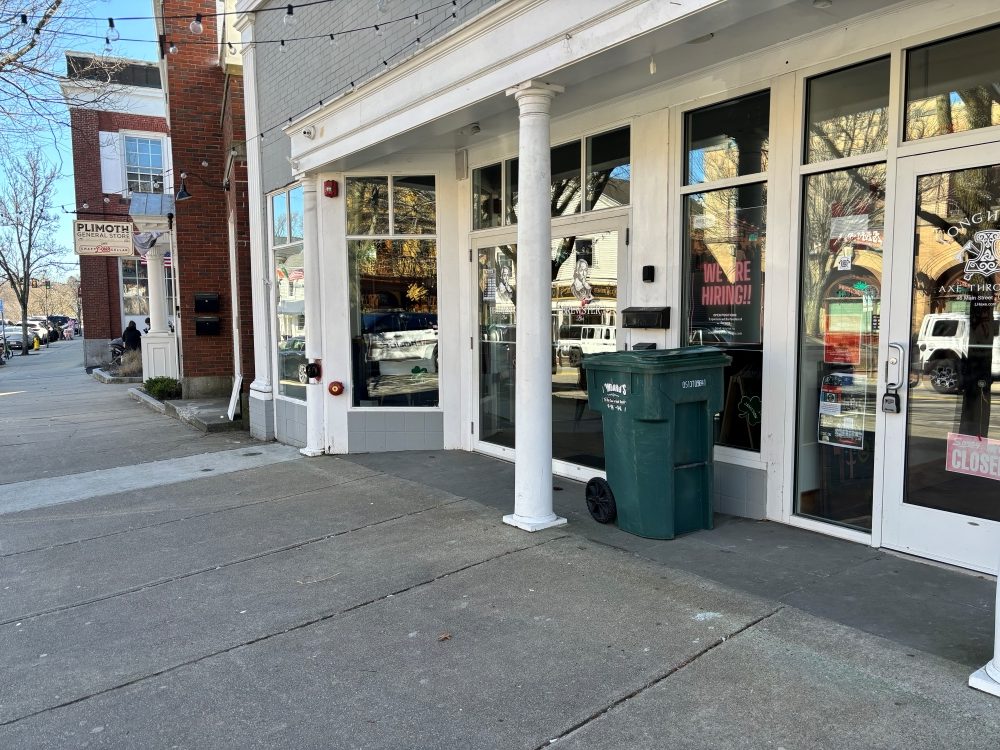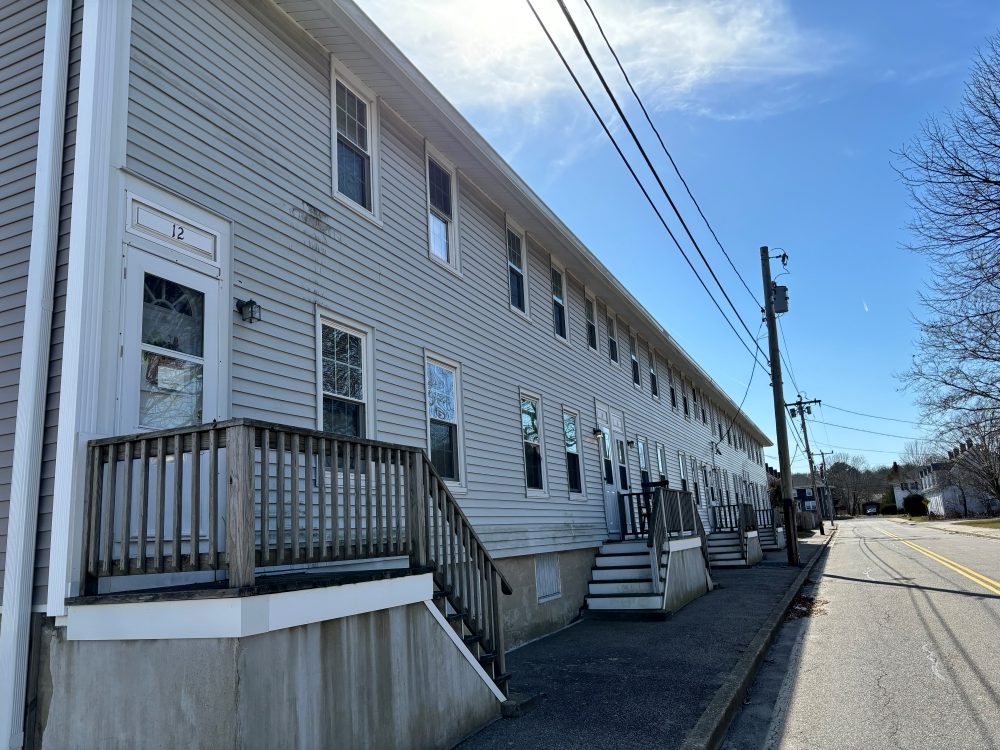The tense encounter could have ended a lot differently.
When Plymouth police answered a call for shots fired on North Spooner Street early Saturday morning, they didn’t know what to expect.
The 911 caller told police the shooter, who was actually a friend, was firing rounds at his home and the neighbor’s. And he was sending menacing texts, threatening to kill him.
Police drove to the suspect’s home on Braley Road — where they spotted 25-year-old Joshua Fitzgerald on his front porch, police reports said. As officers approached, Fitzgerald went inside, where he allegedly holed up in an upstairs bedroom before finally emerging from the front door and walking toward the rear of the property, according to police.
Though the police accounts vary slightly in the details, the three officers all agreed that they drew their weapons — two with rifles, one with a handgun — and pointed them at Fitzgerald, who dropped what turned out to be a 9mm pistol before surrendering.
In their reports, each officer defended his decision to point his gun at Fitzgerald, asserting that “de-escalation was not feasible,” meaning they did not think they could use other techniques to resolve the situation peacefully.
Whether officers were justified in aiming their guns at Fitzgerald is a question that might have been answered with certainty if a body camera policy approved by the town last year had been in effect.
Last spring, Police Chief Dana Flynn devised a body camera plan with the general support of the town’s two police unions — the Plymouth Police Brotherhood and the Plymouth Superior Officers’ Association.
He solicited proposals from several vendors, settling in April on a company called LensLock, which would supply 128 cameras and provide maintenance, support and audio and video storage for five years, at a total cost of $831,360.
The select board approved funding for the program, voting to use money from the federal American Rescue Plan Act (ARPA) to pay for it.
The board, however, was unaware at the time that the police unions had agreed only in principle to the body cam policy and wanted to negotiate specifics, including the possibility of getting extra pay for wearing cameras, Town Manager Derek Brindisi said.
So the plan went nowhere.
Now, as the two police unions enter negotiations for new contracts to take effect July 1 – with body cams on the table – the town doesn’t have the money to pay for them.
The town needs the ARPA money for something else — the problem-plagued Water Street sewer project, whose cost has ballooned to $6.5 million. (The town agreed to pay $2 million more on top of the original $4.5 million price in an agreement it reached with the contractor in February.)
On Tuesday, the select board took back the $831,360 reserved for the body cam program, with no immediate alternative plan to pay for the equipment.
But Brindisi said if the plan is approved by the unions, the town may apply for grants or use operating funds to cover the cost.
Union officials wouldn’t comment, citing ongoing negotiations.
The 2020 murder of George Floyd at the hands of Minneapolis police spurred calls for police reform around the country.
Advocates and public officials called for body cams, arguing they would expose police misconduct and help hold police accountable. They can also clear police facing unfounded allegations of misconduct.
In Massachusetts, body cams have been embraced by communities large and small, though their implementation has been slowed by funding issues and some police resistance.
The Boston Police Department and the Massachusetts State Police have had cameras in place for several years.
A survey of Massachusetts communities provided by Plymouth police showed that as of October, departments in more than 70 communities were already outfitted with body cams.
Hanover, Hingham, Lakeville, Mattapoisett, Middleborough, and Weymouth were among the cities and towns with body cam programs, the survey showed. Many other communities reported being in the process of implementing body-worn-camera plans.
Plymouth officials hope the town will soon join that growing list.
“Body cameras are going to be an important tool that will enhance officer safety, and improve upon our transparency,” said Chief Flynn. “Our number one goal is to maintain the trust of our residents.”
Police spokesman Capt. Jason Higgins cited a study conducted by the International Association of Chiefs of Police that concluded video footage cleared officers 93 percent of the time in disputed cases.
“In the majority of cases,” Higgins said, “officers act appropriately.”
Brindisi also emphasized that the point is to help police: “We’re saying this is to protect you guys so you’re not wrongfully charged.”
Meanwhile, Fitzgerald remains in the Plymouth County House of Correction. At a hearing in Plymouth District Court on Friday, March 15, Judge Kristen A. Stone ordered him held for up to 120 days. His next court date is scheduled for April 17.

Jacob Lippman, a resident of one of the North Spooner Street homes that was struck by gunfire, told police that he, Fitzgerald, and other friends were socializing at Brewster Bar on Main Street Friday night, March 8, when Fitzgerald, who had allegedly been drinking and using cocaine, started insulting Lippman’s sister.
Fitzgerald, he told police, was a “confrontational drunk known to become aggressive toward friends and strangers alike while under the influence.”
When Fitzgerald wouldn’t stop badmouthing his sister, Lippman told police, he punched Fitzgerald in the face.

Lippman went home, arriving at around midnight. Shortly thereafter, Fitzgerald allegedly began sending menacing text messages to him and his sister, Jordan, threatening to kill them both, police said.
A few minutes later, they heard a gunshot and a car speed away. Fifteen minutes after that, they heard a second shot; then an hour later, a third. After the third shot, Lippman called police.
Police found three bullet holes in the apartments at 12 and 14 North Spooner Street, which are adjacent units in a multi-family building.
After Fitzgerald’s arrest, a clerk found probable cause to charge him with multiple serious crimes — including four counts of armed assault to murder, seven counts of assault with a dangerous weapon and carrying a firearm without a license.
He faces the possibility of substantial prison time, though his lawyer, Sabrina Bonanno, said at his March 11 arraignment that he has no prior criminal record.
Bonanno did not respond to requests for comment.
Andrea Estes can be reached at andrea@plymouthindependent.org.

